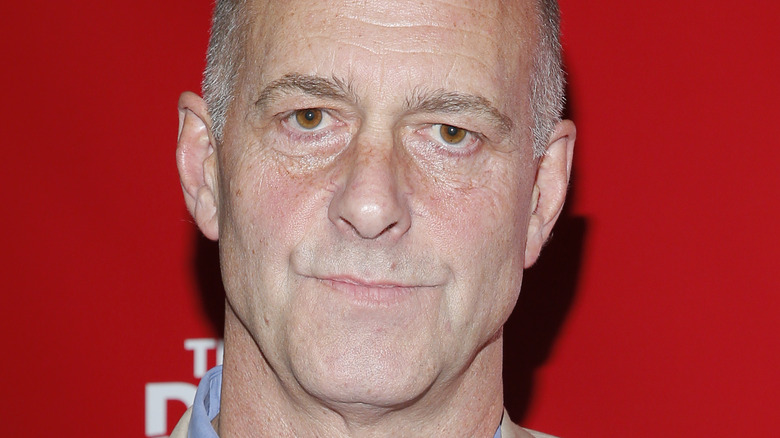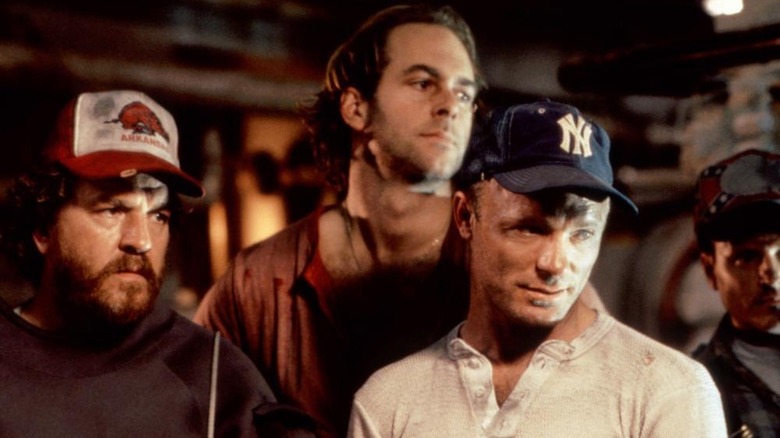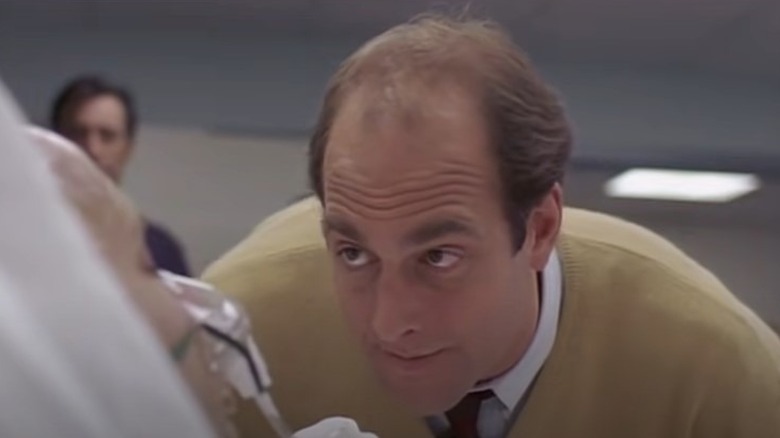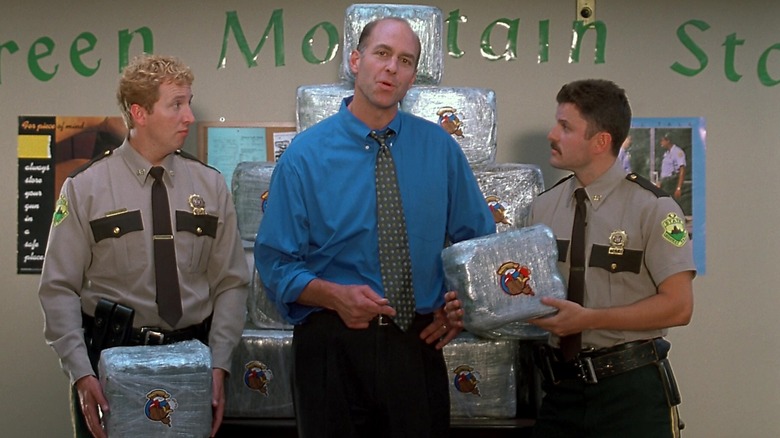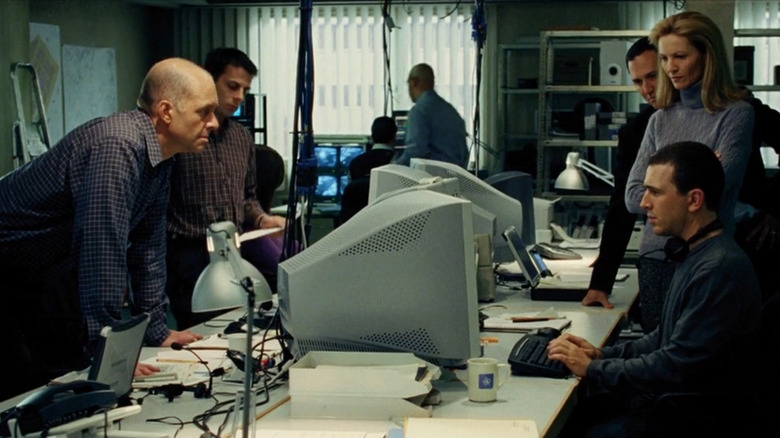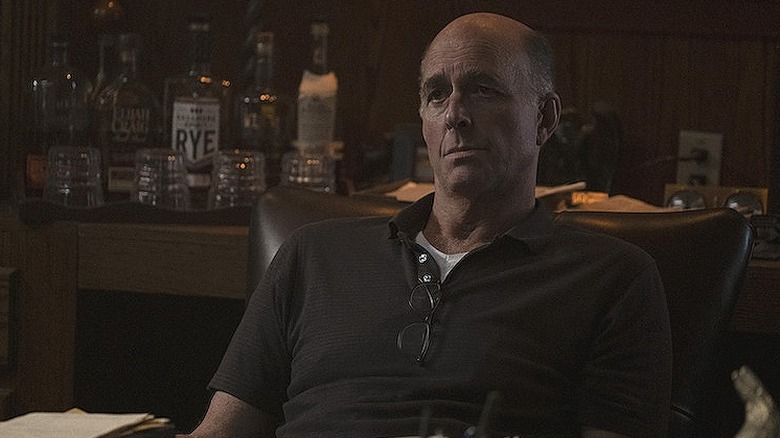Why Jerry Ryan From Law & Order Looks So Familiar
"Law & Order" is a series that explores the different sides of the law enforcement world through storytelling and character development. They routinely face, debate, or navigate social issues surrounding the police and court justice systems. In Season 22, Episode 4, "Benefit of the Doubt," Detective Frank Cosgrove (Jeffrey Donovan) and Detective Jalen Shaw (Mehcad Brooks) hit a wall in a case involving the murder of an author. Cosgrove calls in a former mentor of his, Detective Jerry Ryan, to help him break the case.
Ryan has been through many cases similar to this one and is also the Godfather to Cosgrove's daughter. There is a lot of trust between them, and Cosgrove follows his lead wherever it takes them. Shaw is slightly suspicious of Ryan's methods but ultimately goes with them. When faced with no probable cause and the prospect of a suspect driving away with a mountain of possible evidence in the car, Detective Ryan conveniently notices blood in the car. They search the vehicle, which leads to evidence that is paramount in the suspect's conviction. Cosgrove, not wanting to believe that his mentor lied about the blood and planted evidence, eventually believes he did and ends their relationship.
The episode is a poignant lesson that experience doesn't always mean good, and the law giving rights to criminals isn't evil. Detective Jerry Ryan is an example of a long-lost mantra of the end justifies the means, a mantra that police now can't live by. The actor portraying the crooked detective is one that has been around for decades, and if he looked familiar, this is where you have seen him before.
John Bedford Lloyd faced an alien entity in The Abyss
James Cameron has spent four decades bringing some of the biggest films in the history of cinema to the screen. From writing "Aliens" and "Rambo: First Blood Part II" to helming massive successes like "The Terminator," "Titanic," and "Avatar," he has been at the center of seemingly every cultural phenomenon. Between "The Terminator" and "Terminator 2: Judgement Day," Cameron helmed his first foray into the depths of the ocean (one that would become a well-documented obsession with the deep) with "The Abyss."
The film follows a U.S. submarine that has an encounter with an unknown underwater entity and sinks. The U.S. Government sends a team of Navy SEALs along with a deep-sea drilling team to recover the vessel before the Russians. The drilling platform's designer, Dr. Lindsey Brigman (Mary Elizabeth Mastrantonio), insists on going along with the SEAL Team and meets up with the drill team's leader and ex-husband, Virgil "Bud" Brigman (Ed Harris). While the two units try to work together to bring the vessel's nuclear payload back to the surface, all while coming face to face with something not of this world.
John Bedford Lloyd appeared alongside Harris as Jammer Willis, who is one of Bud's trusted crew members. He likely had as hard of a time on set as the rest of the crew had (SyFy chronicled the danger the actors faced daily), and as this was his first big movie, he could have given up his acting for good. His long blond hair and massive frame might have stood out among his co-stars, but it raised questions about the likelihood of someone that big working on an underwater vessel.
He said goodbye to Tom Hanks in Philadelphia
1993 brought one of Tom Hanks' first significant successes on screen when he won the Academy Award for best actor for his role in "Philadelphia." His co-star, Denzel Washington, played a successful personal injury lawyer who takes on Hanks' wrongful termination suit against a prominent law firm and faces his own internal prejudices against AIDS and the homosexual community. The film also featured Antonio Banderas and the Academy Award-winning original song, "The Streets of Philadelphia," by Bruce Springsteen.
"Philadelphia" follows Andrew Beckett (Hanks) as a successful attorney on a rising path in a high-powered law firm in Philadelphia. When he discovers he has AIDS, he is sabotaged by a partner in the firm and fired. He believes he is fired because of his sickness and brings a lawsuit for wrongful termination. His attorney, Joe Miller (Washington), displays fear and prejudice against Andy but works through it, gaining compassion for his client and the treatment he faces due to his condition. Ultimately, the firm is ordered to pay $5 million in damages, but Andy doesn't get to enjoy the victory. In an emotional scene by his hospital bed, his friends and family said their goodbyes, including Joe overcoming his fear and touching his face. The film ends with his memorial service and watching home movies of him as a happy child.
John Bedford Lloyd appears in the film as Andy's brother Matt, and he is one of the first to lean in and say goodbye before the character succumbs to his illness. The film served as a commentary on the AIDS crisis and the fear it instilled. It found a way to change the national conversation, according to PBS' Whyy. Lloyd's character seemed to be accepting of Andy's condition throughout the film, like most of his family.
He commended the Super Troopers for a drug bust
"Super Troopers" gave law enforcement what "Waiting" gave the service industry. In a world where people feel entitled to the service and protection of those that are charged to provide it, "Super Troopers" is a collection of gags and goofs that make up the fantasy of those behind the badge. The brainchild of Jay Chandrasekhar, "Super Troopers" follows a group of Vermont State Troopers facing the closing of their department. At a time when they should be on their best behavior, they can't help but be themselves and run wild with their shenanigans.
In an attempt to woo a city cop into a romantic relationship, one of the State Troopers stumbles upon a massive cache of drugs that they believe will save their department from being shut down. The five Troopers embark on an investigation (fumbling it at every turn like any other they've had) that leads them to the discovery that the city cops are involved in a drug smuggling ring.
John Bedford Lloyd appears in the film in a small role as the mayor of the town where the Troopers' station is located. When they make the drug bust, he comes to congratulate them and take photos, the last of which involves him with a shotgun, lowering himself to the same immature level as the Troopers. The film was one of those Rotten Tomato battles between the hate of the critics (36%) and the love of the audience (90%). Love it or hate it, Lloyd is arguably the best minute-for-minute part of the film, taking his cumulative dozen lines and making most of them memorable.
He chased after Jason Bourne in The Bourne Supremacy
Adapting a successful book series to movies is a tricky business. While fans, actors, and studios hope that it will become a James Bond or Harry Potter-type success, there is always a chance that it ends up closer to "Eragon" or "Divergent." One of the more successful in the genre came in the early 2000s when Matt Damon took on the role of Robert Ludlum's Jason Bourne in "The Bourne Identity." While Damon was a little bit of a surprise pick for the cast, he embodied the character and took the film to a $214 million haul (per Box Office Mojo) at the box office on a $60 million budget.
With that kind of success, Universal Pictures was incentivized to make a sequel, which they did two years later in 2004. When talking about the sequel in an interview, Damon confessed that he was hesitant to do it since most sequels are a disappointment to the fans. Luckily for him, "The Bourne Supremacy" was even more successful than the first, raking in $290 million and leading the franchise to produce two more sequels.
There are three aspects that are paramount to making a successful Bourne movie — a talented assassin on his trail, a fight with an unorthodox weapon (a pen, a rolled-up magazine, and a book in the first three films), and a team of CIA analysts tracking his every move. John Bedford Lloyd appears in "The Bourne Supremacy" as Teddy, an analyst for the CIA. Although he is overshadowed by the presence of a young Michelle Monaghan, he does a great job getting Brian Cox some coffee.
He antagonized Jason Bateman in Ozark
Netflix changed the way audiences receive their favorite shows. Instead of waiting the traditional week between episodes, the streamer elected to dump whole seasons at once. One of their more popular series that they created and kept fans clamoring for more is "Ozark." The show follows Marty Byrde (Jason Bateman) and his wife Wendy (Laura Linney) when they suddenly move from a suburb of Chicago to central Missouri. After a money laundering scheme for a Mexican cartel goes awry, Byrde bargains with the drug lord and negotiates setting up a new operation in the Lake of the Ozarks, where they come into conflict with local criminals and the Kansas City mafia.
John Bedford Lloyd appears in Seasons 2, 3, and 4 as Frank Cosgrove, the head of the Kansas City mafia — and definitely not related to the Frank Cosgrove that Lloyd's character mentored in the "Law & Order" universe. He spends his entire time on the show managing an uneasy alliance with Byrde and trying to keep his son, Frank Jr. (Joseph Sikora), in line. While he wields considerable power due to his status, he eventually meets his end when he enters the house of his rival, Darlene Snell (Lisa Emory), never to be seen again.
In an interview with TV Line, showrunner Chris Munday revealed the possibility of spin-offs. "It's definitely something that people have talked about a bunch," he said. While he hinted at a spin-off for Julia Garner's Ruth Langmore, a story that takes the production to Kansas City and explores the origins of Frank Cosgrove could work quite well.
